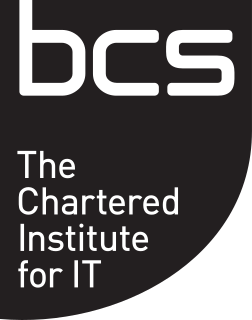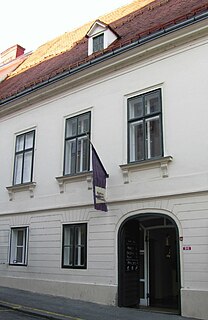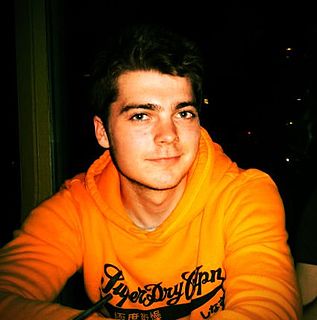Related Research Articles
A web portal is a specially designed website that brings information from diverse sources, like emails, online forums and search engines, together in a uniform way. Usually, each information source gets its dedicated area on the page for displaying information ; often, the user can configure which ones to display. Variants of portals include mashups and intranet "dashboards" for executives and managers. The extent to which content is displayed in a "uniform way" may depend on the intended user and the intended purpose, as well as the diversity of the content. Very often design emphasis is on a certain "metaphor" for configuring and customizing the presentation of the content and the chosen implementation framework or code libraries. In addition, the role of the user in an organization may determine which content can be added to the portal or deleted from the portal configuration.

The Department for Digital, Culture, Media and Sport (DCMS) is a department of the United Kingdom government, with responsibility for culture and sport in England, the building of a digital economy, and some aspects of the media throughout the UK, such as broadcasting and the Internet.

BCS, The Chartered Institute for IT, known as the British Computer Society until 2009, is a professional body and a learned society that represents those working in information technology (IT) and computer science, both in the United Kingdom and internationally. Founded in 1956, BCS has played an important role in educating and nurturing IT professionals, computer scientists, computer engineers, upholding the profession, accrediting chartered IT professional status, and creating a global community active in promoting and furthering the field and practice of computing.

BBC Online, formerly known as BBCi, is the BBC's online service. It is a large network of websites including such high-profile sites as BBC News and Sport, the on-demand video and radio services branded BBC iPlayer and BBC Sounds, the children's sites CBBC and CBeebies, and learning services such as Bitesize. The BBC has had an online presence supporting its TV and radio programmes and web-only initiatives since April 1994, but did not launch officially until 28 April 1997, following government approval to fund it by TV licence fee revenue as a service in its own right. Throughout its history, the online plans of the BBC have been subject to competition and complaint from its commercial rivals, which has resulted in various public consultations and government reviews to investigate their claims that its large presence and public funding distorts the UK market.

Ars Technica is a website covering news and opinions in technology, science, politics, and society, created by Ken Fisher and Jon Stokes in 1998. It publishes news, reviews, and guides on issues such as computer hardware and software, science, technology policy, and video games.

Computer Weekly is a digital magazine and website for IT professionals in the United Kingdom. It was formerly published as a weekly print magazine by Reed Business Information for over 45 years. Topics covered within the magazine include outsourcing, security, data centres, information management, cloud computing, and mobile computing to computer hacking and strategy for IT management.

A virtual museum is a digital entity that draws on the characteristics of a museum, in order to complement, enhance, or augment the museum experience through personalization, interactivity and richness of content. Virtual museums can perform as the digital footprint of a physical museum, or can act independently, while maintaining the authoritative status as bestowed by the International Council of Museums (ICOM) in its definition of a museum. In tandem with the ICOM mission of a physical museum, the virtual museum is also committed to public access; to both the knowledge systems imbedded in the collections and the systematic, and coherent organization of their display, as well as to their long-term preservation.
The Museum Computer Network (MCN) is a US-based non-profit organization for professionals with an interest in the use of computer technology for museums.
The Conservative Muslim Forum is a group within the British Conservative Party. It aims to increase Conservative Party's knowledge and comprehension of issues and circumstances that have particular relevance to Muslim communities and develop suitable responses. It also seeks to increase support for the Conservative Party within the Muslim community. Anyone who is eligible to vote in British general or local elections regardless of race, colour or creed may become a member of the Conservative Muslim Forum. It will however be necessary for a person applying for membership of the Conservative Muslim Forum to be an existing member of the Conservative Party or apply for such membership simultaneously.

Heritage Railway Association (HRA) is an umbrella organisation representing the majority of the heritage and tourist railways, railway museums, steam centres and railway preservation groups in the UK and Ireland.
The Conservative Science & Technology Forum is a United Kingdom think tank and policy advisory body that consults industry, academia and other key figures on important technological and societal issues and puts these into mainstream political context.

Nemat Talaat Shafik, Baroness Shafik,, known as Minouche Shafik, is an Egyptian-born British-American economist who has been serving as the Director of the London School of Economics since September 2017.

Science and technology in the United Kingdom has a long history, producing many important figures and developments in the field. Major theorists from the United Kingdom of Great Britain and Northern Ireland include Isaac Newton whose laws of motion and illumination of gravity have been seen as a keystone of modern science and Charles Darwin whose theory of evolution by natural selection was fundamental to the development of modern biology. Major scientific discoveries include hydrogen by Henry Cavendish, penicillin by Alexander Fleming, and the structure of DNA, by Francis Crick and others. Major engineering projects and applications pursued by people from the United Kingdom include the steam locomotive developed by Richard Trevithick and Andrew Vivian, the jet engine by Frank Whittle and the World Wide Web by Tim Berners-Lee. The United Kingdom continues to play a major role in the development of science and technology and major technological sectors include the aerospace, motor and pharmaceutical industries.

The Museum of Broken Relationships is a museum in Zagreb, Croatia, dedicated to failed love relationships. Its exhibits include personal objects left over from former lovers, accompanied by brief descriptions.
TeaMp0isoN was a computer security research group consisting of 3 to 5 core members. The group gained notoriety in 2011/2012 for its blackhat hacking activities, which included attacks on the United Nations, NASA, NATO, Facebook, Minecraft Pocket Edition Forums, and several other large corporations and government entities. TeaMp0isoN disbanded in 2012 following the arrests of some of its core members, "TriCk", and "MLT".

Richard O'Dwyer is a British entrepreneur & computer programmer who created the TVShack.net search engine while a student at Sheffield Hallam University.
Electoral Calculus is a political forecasting web site which attempts to predict future United Kingdom general election results. It considers national factors but excludes local issues.
CronLab Limited is a privately held limited company which provides information security web filtering software to businesses and the public either directly or via integration into third party products.
The cyber security community in the United Kingdom is diverse, with many stakeholders groups contributing to support the UK Cyber Security Strategy. The following is a list of some of these stakeholders.
References
- ↑ "UK Museums on the Web 2010". Museums Computer Group, UK. 2010. Archived from the original on 15 March 2011. Retrieved 1 August 2011.